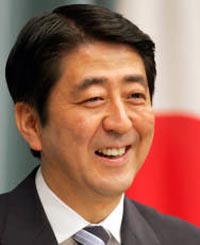Another Japanese minister admits financial discrepancies. Who's next?

Shinzo Abe faces new poll problems. Just a week after naming a new Cabinet, Japan's Prime Minister was hit Wednesday with yet another scandal - calls for his environment minister to resign over misreported funds.
It was the sixth scandal for a Cabinet member in Abe's first year. Four have resigned - including one this week - and one killed himself in May.
In the latest fracas, Environment Minister Ichiro Kamoshita acknowledged an organization managing his political funds borrowed 12 million yen from him by 1997, but reported borrowing only 10 million (US$86,200; euro63,475).
Later the group reported borrowing a total of 23 million yen (US$198,300; euro146,000) from him, but Kamoshita said he had only loaned them 15 million.
Kamoshita said Wednesday that the discrepancies were "by mistake."
"I will look into what had happened," he said.
Making a false statement in political funding reports is punishable by up to five years in prison or 1 million yen (US$8,600; EUR6,300) in fines.
Critics say politicians underreport or overreport funding to hide expenses they cannot account for, such as funeral offerings for which they cannot get receipts.
Kamoshita denied any ill intent, and Abe and other government officials rallied to his defense.
But they acknowledged they were concerned about the potential fallout.
"If it's clerical mistake, I don't think this is a case (that requires his resignation)," Abe said. Kamoshita should correct the mistake and offer a full explanation, he said.
"At this point, we were told it's a clerical mistake," said Matsushige Ono, the deputy Cabinet secretary, but he added: "We have to respond to the people's severe concerns and doubts regarding political funds."
Though not himself tainted by scandal, Abe has a dismal record in naming Cabinet members.
The last time five ministers resigned or left a Cabinet in disgrace during its first year was 1992-1993 under the late Prime Minister Kiichi Miyazawa.
Abe's third agriculture minister in the past four months, Takehiko Endo, resigned on Monday after acknowledging that a farm cooperative he headed had received 1.15 million yen (US$9,930; EUR7,250) in government subsidies by exaggerating weather damage to a 1999 grape harvest.
Abe's first agriculture minister, Toshikatsu Matsuoka, killed himself in May amid allegations he misused public money. His successor, Norihiko Akagi, resigned in August in a separate scandal. Two other ministers also have had to quit Abe's Cabinet.
Abe has brushed off calls from the opposition that he resign, but the repeated scandals could lead to delays in the passage of key legislation, including a bill to extend Japan's support of coalition forces in Afghanistan.
Abe's support with the public is also suffering. After last week's reshuffle, his support stood at about 44 percent, well below the roughly 70 percent support Abe enjoyed soon after taking office last September.
Jin Igarashi, political scientist at Hosei University in Tokyo, said the latest case may not have been seen as a big issue had it not been for the troubles Abe's Cabinet has already been rocked by.
"This is a price Abe is paying now for not having resigned," he said.
Subscribe to Pravda.Ru Telegram channel, Facebook, RSS!




